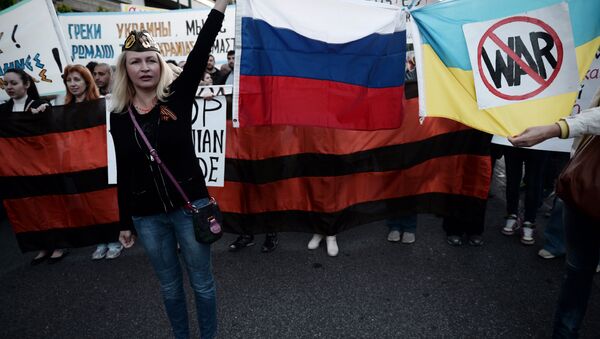On Monday, Ukrainian President Petro Poroshenko signed into law a bill banning the use of the Ribbon of St. George, a symbol of victory in the Great Patriotic War which is commonly used in commemorative celebrations in Russia and throughout the former Soviet Union.
Carrying, manufacturing, or promoting the ribbon is now punishable by a fine of up to 2,550 hryvnia (about $100 US), and repeat 'offenders' face more severe penalties up to and including arrest.
The 'Ribbon of St. George' law was one of several anti-Russian laws passed by Ukrainian authorities in recent weeks. Last week, authorities further tightened language quotas on shows and movies broadcast by Ukrainian television. A week earlier, officials announced that Kiev had worked out the legal mechanisms for introducing a visa regime with Russia, a decision which Moscow said would have catastrophic consequences for the country's economy, since it is highly dependent on remittances from Ukrainians living and working in Russia.
Asked for comment, Vadim Kolesnichenko, a Ukrainian and Russian politician and the chairman of the presidium of the Internal Council of Russian Compatriots, told Radio Sputnik that the law on the ribbons of St. George was an integral part of Kiev authorities' Russophobic policy.
"We understand that this is, in effect, a form of intimidation, and a demonstration of hatred of one's own past," Kolesnichenko said. "Unfortunately, this kind of law is an integral part of Kiev's broader Russophobic policy."
"The task is very simple," the politician noted, and consists of "running from Russia, running from our common past." At the same time, Kolesnichenko stressed that it was always important to emphasize that Ukraine's present authorities and the country's ordinary population are "two separate entities" when it comes to attitudes toward their eastern neighbors, and the two countries' common history.
Unfortunately, Kolesnichenko said that Europe is unlikely to pay any attention to Kiev's latest anti-Russian outbursts.
"It's necessary to clearly understand that Europe, unfortunately, will not react to these glaring violations. This, undoubtedly, is a disgrace for Europe, which is considered to be a highly refined and intellectual place. But at the same time it is profitable for them, because it means the destruction of the Soviet and Russian past, and of Ukraine's Russian roots. This is an attempt to build a new statehood, a state ideology, through intimidation and blackmail," Kolesnichenko concluded.



